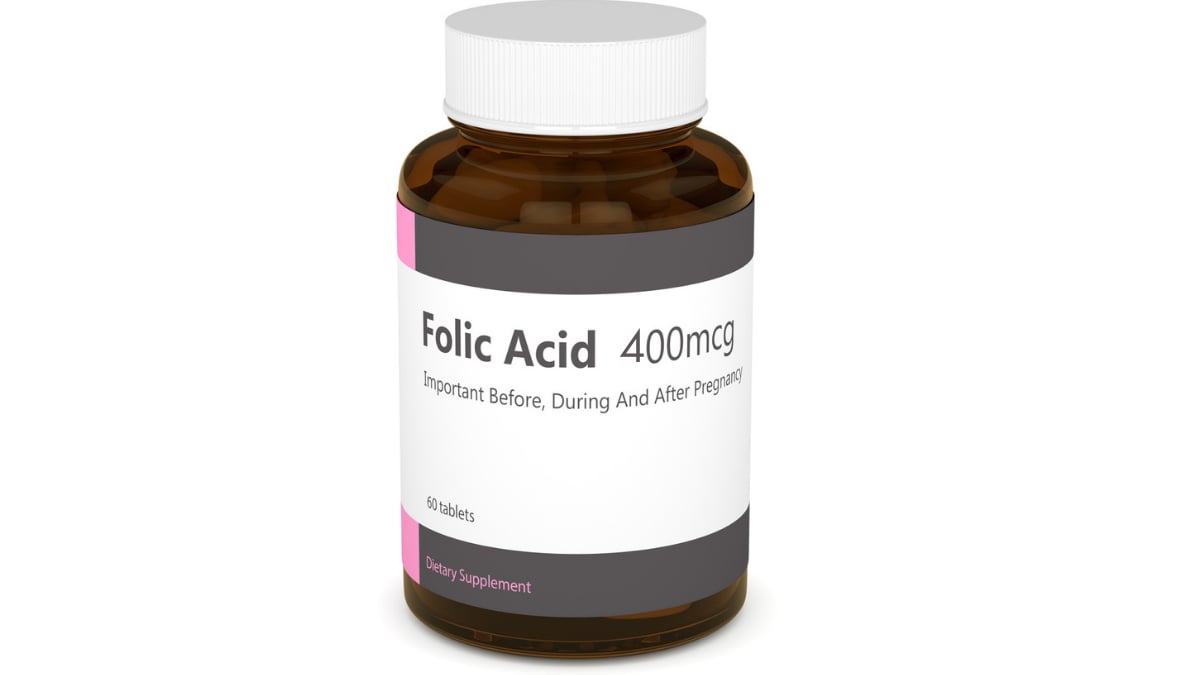Key points
- Folic acid is a form of folate, a B vitamin that helps your body make new cells.
- All people capable of becoming pregnant should get 400 mcg of folic acid every day.
- Getting 400 micrograms of folic acid daily can help prevent a type of serious birth defects called neural tube defects.

Why it's important
Folic acid is a form of folate, which is a B vitamin. It helps your body make new cells (for example, blood cells, brain cells, skin, hair, and nails). Every new cell in the body needs folate.
Folic acid is especially important during early pregnancy, because it helps the neural tube—which becomes the brain and spine—develop. It is the only form of folate that's been shown to help prevent serious birth defects called neural tube defects (NTDs). NTDs are major birth defects of the baby's brain (such as anencephaly) and spine (such as spina bifida). NTDs happen in the first few weeks of pregnancy, often before you know you are pregnant.
Also, about half of all pregnancies in the United States are unintended. By the time you realize you're pregnant, it might be too late to prevent an NTD. That is why getting 400 micrograms (mcg) of folic acid before and during early pregnancy is important to help prevent NTDs.
Even if you're not planning to become pregnant, getting 400 mcg of folic acid daily is important. Your body uses folic acid to make new cells. Start a healthy habit today by getting 400 mcg of folic acid every day.

Terms to know
The terms folate and folic acid are often used interchangeably. However, folate is a general term used to describe many different forms of vitamin B9. This includes folates occurring naturally in foods and forms that are man-made:
- Dihydrofolate (DHF)
- Tetrahydrofolate (THF)
- 5, 10-methylenetetrahydrofolate (5, 10-methylene-THF)
- 5-methyltetrahydrofolate (5-methyl-THF or 5-MTHF)
- Folic acid
Folic acid is a form of folate that is used in supplements (vitamins) and fortified foods, such as breakfast cereals.
Recommendations
General recommendation
If you could become pregnant, the U.S. Public Health Service recommends that you get 400 mcg of folic acid daily to help prevent NTDs.1
In addition, this recommendation is supported by the Institute of Medicine and the US Preventive Services Task Force.
If you've had a previous pregnancy affected by an NTD
If you had a previous pregnancy affected by an NTD and you're planning to become pregnant again, talk with your healthcare provider. The current recommendation is that you should get 4,000 mcg of folic acid daily. You should start taking folic acid 1 month before becoming pregnant again and continue taking folic acid through the first 3 months of pregnancy. If you're not planning to become pregnant, you should get 400 mcg of folic acid daily.
What the research shows
Researchers have studied the link between low folate levels and NTDs since 1965. These studies showed that low levels of folate in the blood increased the risk of NTDs.2
In the 1990s, two large randomized controlled trials showed that taking vitamins with folic acid helped reduce the risk for NTDs. One trial focused on preventing another NTD-affected pregnancy among individuals who had already had an NTD-affected pregnancy. The other looked at preventing NTDs among individuals who did not have a history of an NTD-affected pregnancy. Both these studies showed that taking folic acid before and during pregnancy helped lower the chance of having a baby affected by an NTD.
Additional research has looked at
- How taking folic acid daily boosts folate levels in the blood.
- When taking folic acid helps prevent NTDs.
- How adding folic acid to foods affects occurrence of NTDs.
Overall, these studies show that getting enough folic acid can help prevent NTDs. These findings led to and have supported the recommendation that people who can become pregnant should take 400 mcg of folic acid daily.
The Story of Folic Acid Fortification
What you can do
- Start a healthy habit: Start getting 400 mcg of folic acid daily, even if you're not planning a pregnancy.
- Plan ahead: If you're thinking about becoming pregnant, start taking folic acid at least 1 month before conception. Continue taking folic acid during pregnancy.
- Check supplement and nutrition labels: Be sure to look at your vitamin and fortified foods labels to ensure they contain folic acid.
- Eat folate-rich foods: Incorporate folate-rich foods into your diet, such as leafy greens, beans, or oranges.
- Consult a healthcare provider: Talk to your doctor about folic acid and any questions you may have.
- Recommendations for the use of folic acid to reduce the number of cases of spina bifida and other neural tube defects. MMWR Recomm Rep. 1992;41(RR-14):1–7
- Crider, K. S., Qi, Y. P., Yeung, L. F., Mai, C. T., Head Zauche, L., Wang, A., Daniels, K., & Williams, J. L. (2022). Folic acid and the prevention of birth defects: 30 years of opportunity and controversies. Annual Review of Nutrition, 42(1), 423–452.
- Centers for Disease Control and Prevention (CDC). Use of folic acid for prevention of spina bifida and other neural tube defects—1983–1991. MMWR Morb Mortal Wkly Rep. 1991;40(30):513–516.
- Institute of Medicine (US). Dietary reference intakes for thiamin, riboflavin, niacin, vitamin B6, folate, vitamin B12, pantothenic acid, biotin, and choline. Washington (DC): National Academies Press (US); 1998.
- US Preventive Services Task Force. Folic acid supplementation to prevent neural tube defects: preventive medication. Final Recommendation Statement (2023, August 1).
